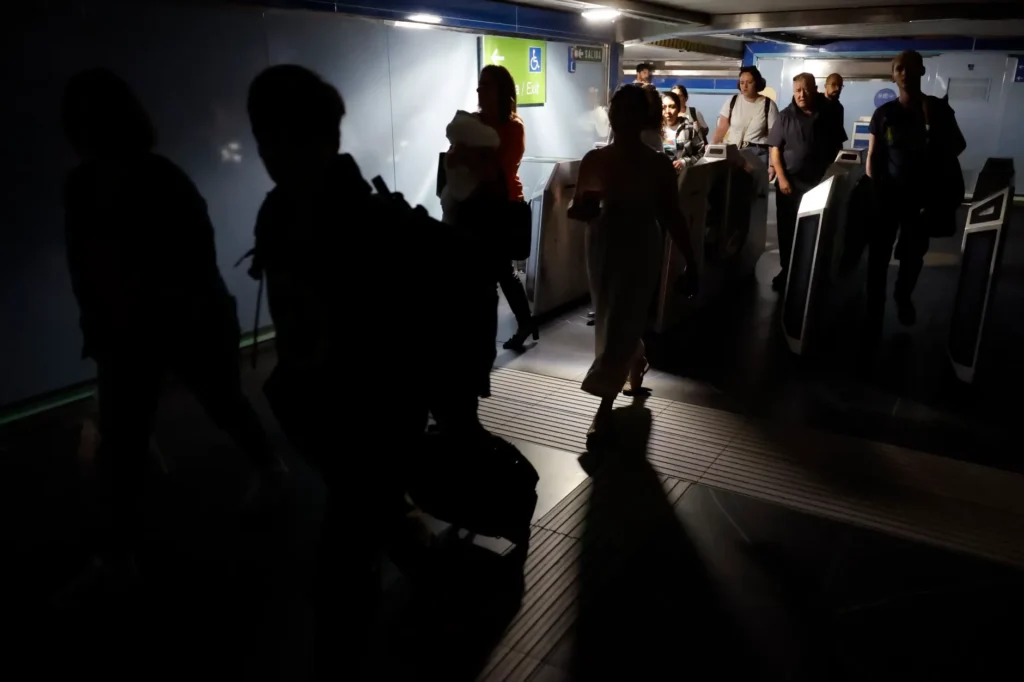MADRID — Vast swaths of Spain and Portugal were plunged into darkness Monday after a massive power outage disrupted electricity, internet services, and transportation across the Iberian Peninsula, sparking fears of a cyberattack possibly linked to Russia.

The outage, which also affected parts of southwestern France, left airports, hospitals, supermarkets, and public transport systems paralyzed. Spanish officials confirmed that the country’s entire train network ground to a halt, while Madrid’s metro system was evacuated and city streets descended into gridlock as traffic lights failed.
Emergency responders were deployed across major urban centers to manage the cascading chaos. In hospitals, surgeries were canceled, and medical staff scrambled to safeguard patients reliant on oxygen machines, whose lives were at immediate risk.
Spain’s national electricity operator, Red Eléctrica, reported a precipitous drop in the national power supply shortly after midday, indicating a sudden and massive system disruption. The company said full restoration of services could take between six and ten hours, and vowed to commit all available resources to the recovery effort.
Spanish Prime Minister Pedro Sánchez rushed to Red Eléctrica’s headquarters in Madrid to oversee the response personally. Officials have not ruled out the possibility of a cyberattack, and both Spanish and Portuguese cybersecurity agencies have launched urgent investigations.
Juanma Moreno, president of Andalusia’s regional government, said that early signs point to a “deliberate cyberattack,” warning that hospital generators might only sustain operations for 24 hours without additional support.
The Portuguese Ministry of Internal Administration similarly stated that it was not excluding the possibility of a cyberattack. The Spanish Cybersecurity Coordination Office said it was “too early” to identify the cause but confirmed that a cyberattack was among the scenarios being examined.
The blackout paralyzed daily life. In Madrid and Lisbon, thousands of traffic lights went dark, resulting in severe traffic congestion and numerous accidents. Drivers in Barcelona navigated intersections without guidance, while Valencia suspended all metro services.
Hospitals in Madrid prioritized transferring chronically ill patients dependent on oxygen supplies, as some could not survive more than an hour without power. Healthcare workers described a race against time to protect the most vulnerable.
Shoppers in Portugal and Spain rushed to ATMs as card payment systems collapsed, creating long queues at cash machines. Many supermarkets shuttered for “safety reasons” amid the uncertainty.
Eyewitness accounts captured the scale of the disruption. Lottie Feist, a British student in Lisbon, described the streets as “absolute carnage” with no working traffic lights or public services. “It’s terrifying,” she said. “People are trapped in elevators and nobody knows what’s happening.”
Another resident, Pius Bentgens, reported that a tram in Lisbon suddenly halted mid-journey as the air conditioning system cut out, signaling a broader failure. “It felt eerily quiet,” he said. “Then messages started pouring in from friends across the city — the power was out everywhere.”

The outage also disrupted major events. At the Madrid Open tennis tournament, British player Jacob Fearnley’s match was interrupted by a loud “bang” before play was suspended entirely.
Airports across Spain reported significant disruptions, with air traffic reduced to “half capacity” as flights were canceled or delayed. Passengers were stranded as terminals lost power and emergency lighting systems took over.
The European Commission said Monday it was in contact with Spanish and Portuguese authorities to “understand the underlying cause” of the blackout.
Speculation about Russian involvement mounted quickly. European security officials pointed to recent incidents, including a fire last month at London’s Heathrow Airport, where cyberattack suspicions had also surfaced. While no evidence has yet been made public, experts note that large-scale cyberattacks on critical infrastructure have long been a part of Moscow’s toolkit.
As recovery efforts continue, Spanish and Portuguese authorities are under intense pressure to determine the cause and bolster defenses against future incidents. For millions across the peninsula, Monday’s outage served as a chilling reminder of the vulnerabilities of modern infrastructure.


